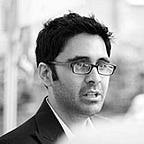Unless You Like Living in This Dystopia, We Need a Revolution
We Need to Rebuild the World For Potential, Not Profit and Power — Or Else We Won’t Have One
I know, I know. Things have gotten dark around here. Sorry. Sometimes…I struggle, too. And then fate intervenes. Patricia emailed to say:
“Your writings are unremittingly dark, with literally no hope that I can ascertain, no suggestions for countering the toxicity of our times. It is very, very hard to maintain sanity when reading all that is crashing and will crash around us. Would it be possible for you to include a bit of eudaimonics in each piece? In this way, you can educate us, your readers, to what is really happening around us while you educate us on the fundamentals, the principles, the strategies for the complete reset you brilliantly propose.”
Patricia, you’re right. Let’s talk for a moment about the future, or how to begin having one again.
We need a revolution if we want the project of human civilisation to endure. Our civilisation now needs to make a quantum leap forward and upward. It’s not going to be easy, and so far we haven’t even begun. Hence, just a smattering of the headlines from this morning: the Antarctic’s melting faster than predicted, yet again, there’s a new Covid variant ripping across the globe, and American democracy is on its last legs. Like this dystopia?
So what kind of revolution am I talking about? The glorious socialist revolution Marx spoke of — and the American right still fears? Sorry, that one already more or less happened — everyone in Western Europe and Canada has basic human rights. I’m talking about the next one.
How did we end up in this dystopia — that’s collapsing at light speed? Well, mostly, it’s because of economics. Economics is the real invisible hand, the force which runs our world. Sadly, the economics which we practice — or which we’re forced to live our lives under — is hyper capitalist. That means it regards everything in terms of first its use value, and then its exchange value.
Think of a tree or a river. The way our world is designed, they’re just commodities. Their only worth is their use-value, and then their exchange-value. The tree has this certain…
